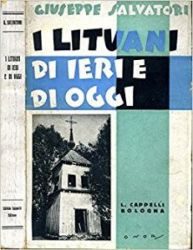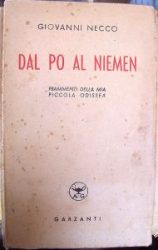GIACOMO DEVOTO
By Jacopo Baiocchi
Giacomo Devoto was an Italian historical linguist and one of the greatest exponents of the twentieth century. He was born in Genova on July 19, 1897.
In 1915, after finishing his studies in Milan, he enrolled at the department of literature in Pavia. Due to World War I, Devoto was forced to stop his studies. He graduated from the university in 1920 with a thesis on the phonetic derangement in India and Romania. The same year he travelled to Berlin, where he attended a few courses by Wilhelm Schulze, Julius Pokorny and Heinrich Luders, dedicated respectively to Lithuanian, Irish and Sanskrit languages. That was Devoto’s first contact with Lithuanian culture. Later, in 1923 in Basel, he took courses of Iranian, Lithuanian, Greek and ancient Latin. In 1924, Devoto attained free teaching and started teaching two years later, in 1926.
 In 1931, Instituto per l’Europa orientale (Institute for Eastern Europe) appointed him to manage magazine Studi Baltici. In order to be able to do his job properly, Devoto tried to strengthen his knowledge of Baltic languages. In fact, in 1933, he went to Lithuania to study Lithuanian. While he was there he also taught at the University of Kaunas for about two months in French and probably Italian. Devoto travelled North twice, where he met some of the greatest Baltic scholars of that time. Because of the war, in 1942 the magazine was temporarily closed. In 1952, it started to be published again. Its last issue came out in 1969.
In 1931, Instituto per l’Europa orientale (Institute for Eastern Europe) appointed him to manage magazine Studi Baltici. In order to be able to do his job properly, Devoto tried to strengthen his knowledge of Baltic languages. In fact, in 1933, he went to Lithuania to study Lithuanian. While he was there he also taught at the University of Kaunas for about two months in French and probably Italian. Devoto travelled North twice, where he met some of the greatest Baltic scholars of that time. Because of the war, in 1942 the magazine was temporarily closed. In 1952, it started to be published again. Its last issue came out in 1969.
In 2004, all Devoto’s works were gathered in a book, Scritti baltistici (Baltistikos raštai), written in two languages, Lithuanian and Italian.
After the war, in 1945, Devoto founded the “Circolo linguistico fiorentino” (Florentine Language Club). He received and successfully completed many important assignments related to cultural and political topics.
Devoto died on December 25, 1974.
GIUSEPPE SALVATORI
By Giordano Angelini
There is not sufficient information to draw a clear timeline of Giuseppe Salvatori’s life. Nevertheless, there is enough information to demonstrate his strong ties with Lithuania.
Salvatori visited Lithuania for the first time in 1923. At first, Kaunas, the provisional capital of the country, made a very bad impression on him. “My heart sank. I thought, how can this village so unpresentable, so unimpressive be the capital of an European country?” he wrote. At that time Kaunas really looked miserable. City’s main streets stank and crooked wooden boards served as sidewalks. However, over the next 20 years, Lithuanian nation had managed to build a true capital city with banks, universities, theatres, a funicular, parks, churches, museums, arenas, and modern residential houses. It showed that a young country speaking a unique and old language can catch up with the modern times.
 Salvatori was among the intellectuals who helped to rebuild the country. He is the author of the first historical monograph in Italian about Lithuania, I Lituani di ieri e oggi, published in 1932. The author focused on the differences between ancient and undeveloped Lithuania and the modern country.
Salvatori was among the intellectuals who helped to rebuild the country. He is the author of the first historical monograph in Italian about Lithuania, I Lituani di ieri e oggi, published in 1932. The author focused on the differences between ancient and undeveloped Lithuania and the modern country.
Salvatori wrote other works about Lithuania. The most famous, L’arte rustica e popolare lituana, published in Milan in 1925, was about Lithuanian folk art, traditions and festivals.
He also examined Lithuania’s economy and business (La Lituania economica e commerciale, 1929), wishing the country to rebuild itself economically and find the ways to enter the European market.
One of his latest works entitled Figure del risorgimento letterario lituano was published in 1932. In it, Salvatori analyzed the development of Lithuanian literature from its beginnings to his time.
Although he was not a Lithuanian, Salvatori made a huge impact on Lithuanian culture and its society.
GIOVANNI NECCO
By Alessia Proietti
 Giovanni Necco, an Italian author, was born in 1895. Although information about him is scarce, I was able to find a few books written by him. These are: Dal po al Niemen: frammenti della mia piccola odissea (1943), Realismo e Idealismo (Realism and Idealism, 1937), Tre racconti albanesi (Three Albanian Stories, 1951), and Storia della letteratura tedesca (The History of German Literature, 1957).
Giovanni Necco, an Italian author, was born in 1895. Although information about him is scarce, I was able to find a few books written by him. These are: Dal po al Niemen: frammenti della mia piccola odissea (1943), Realismo e Idealismo (Realism and Idealism, 1937), Tre racconti albanesi (Three Albanian Stories, 1951), and Storia della letteratura tedesca (The History of German Literature, 1957).
Necco was very interested in Northern Europe, especially in Russian, German and Lithuanian literatures and history. Joseph Roth in his book Giobbe and Friedrich Hebbel in Agnes Bernauer mention that he was also a translator and curator. Necco translated into Italian the Lithuanian book Meile mano.
Today all his works are hard to find. Necco died in 1961.